San Diego Joint Pain Relief in San Diego

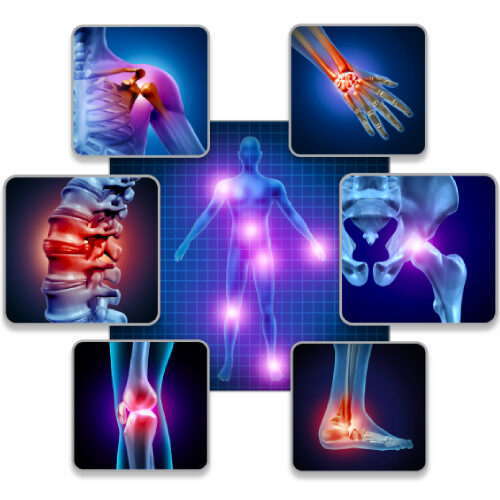
Symptoms Of Poor Joint Health
- Knee pain when walking up stairs or an incline
- Elbow pain after playing golf or tennis
- Joint stiffness in one or more joints
- Painful range of motion in one or more joints
- History of repetitive joint injuries i.e. multiple ankle sprains or knee injuries
- History of tendon and ligament tears or sprains
- Painful joints while engaging in daily activity
- Painful joints while engaging in weight lifting or physical exercise
Naturopathic Treatments For Joint Pain Relief
Our Approach
Early treatment of joint pain is important in regards to slowing down the progression of the disease.
Excess body weight increases the stress on the weight bearing joints and has been correlated with the development of joint dysfunction.
• Exercise
• Joint protection
• Maintenance of ideal body weight
• Strengthen muscles and balance
• Vitamin D, calcium, and magnesium
• Anti-inflammatory diet
• Anti-inflammatory herbs and nutraceuticals

The research supports a link between obesity and osteoarthritis. Most joint pain relief programs focus on reducing body weight to reduce the load on the weight bearing joints, including the hips, knees, and ankles.
Ask Us About Our Pain Relief Treatments For Your Joints
Book a FREE consultation with one of our experienced naturopathic doctors to learn how we can help.
Book your appointment in San Diego today!
Causes Of Poor Joint Pain:
- Inflammatory diet
- Older age – collagen levels decline with age and make joints more prone to pain and injury
- Arthritis
- Osteoarthritis
- Nutrient deficiencies such as collagen, vitamin C, magnesium, or vitamin D
- Chronic stress and elevated cortisol


- Hormone imbalance such as decreased levels of estrogen or testosterone
- Overuse due to repetitive movements
- Poor muscle strength
- Improper weight lifting form
- Injuries or trauma
- Poor posture
- Sedentary lifestyle
- Autoimmune conditions
What Is Arthritis?
Conditions That Can Benefit From Joint Pain Relief:

- Osteoarthritis of the knee
- Joint pain stiffness
- Tennis elbow
- Golfers elbow
- Rotator cuff injuries
- Connective tissue injury
- Sports related injuries including ACL and MCL
- Tendinopathy/tendonitis
- Meniscal tears
The Gut-joint Axis
The gut related antigens from the pathogens, bacteria, and proteins in food can contribute to tissue inflammation and joint dysfunction.
Specifically, bacteria in the gut can produce a toxin called lipopolysaccharide (LPS) that can produce inflammatory cytokines in the joints, like that seen in arthritis.
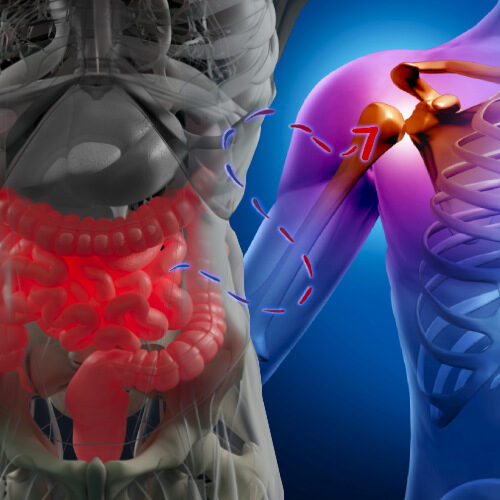
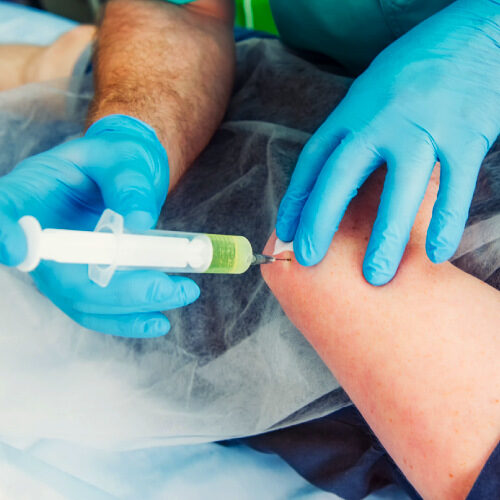
Conventional Treatments For Joint Pain Relief
- NSAID drugs (non-steroidal anti-inflammatories) like advil, aspirin, or naproxen
- COX-2 inhibitors (celecoxib)
- Physical therapy
- In severe cases opioid drugs
- Cortisone injections
List Of Nutrients For Joint Health:
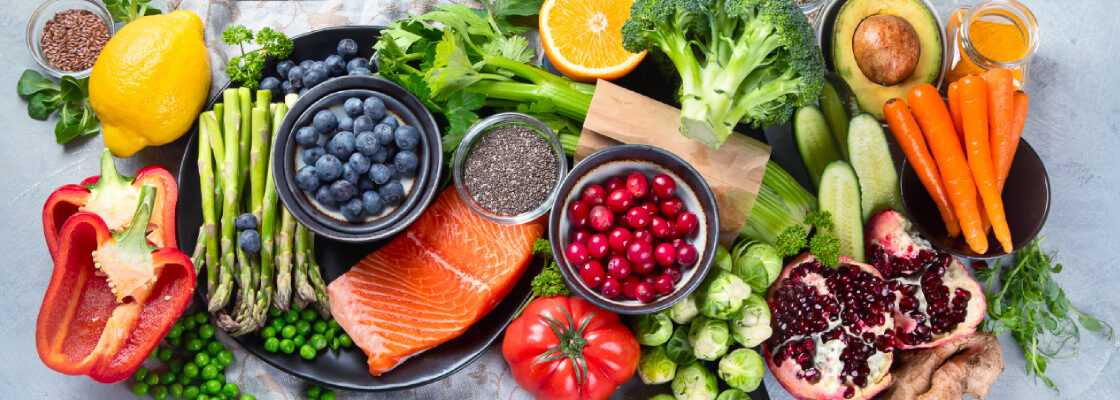
- Curcumin
- Curcumins anti-inflammatory effects have been compared to that of hydrocortisone. Curcumin reduces inflammation by inhibition NF-KB and blocking COX and LOX, resulting in a reduction of leukotrienes and prostaglandins.
- Stimulates tissue repair and regeneration of muscle
- Ginger
- Anti-inflammatory, antioxidant
- Boswellia
- Anti-inflammatory in the body and works by inhibiting the enzyme that controls the production of leukotrienes, 5-lipoxygenase. Can be helpful for the treatment of rheumatoid arthritis and osteoarthritis.
- Collagen
- Keeps our cartilage healthy so our joints are properly cushioned
◦ Has been shown to support healthy joints by reducing pain and stiffness.
- Keeps our cartilage healthy so our joints are properly cushioned
- Vitamin C
- Is vital in the production of collagen in the body.
◦ Vitamin C dependent enzymes combine proline and glycine to trigger collagen synthesis.
- Is vital in the production of collagen in the body.
- Vitamin D
- Involved in the inflammatory response and has been shown to reduce proinflammatory cytokines i.e. IL-6, IL-12, CRP, TNF-alpha and reduce pain.
◦ Calcium absorption is also highly dependent on adequate vitamin D levels.
- Involved in the inflammatory response and has been shown to reduce proinflammatory cytokines i.e. IL-6, IL-12, CRP, TNF-alpha and reduce pain.
- Magnesium
- Many people are deficient in magnesium, and a magnesium deficiency can lead to elevated levels of inflammation and increased risk of joint pain.
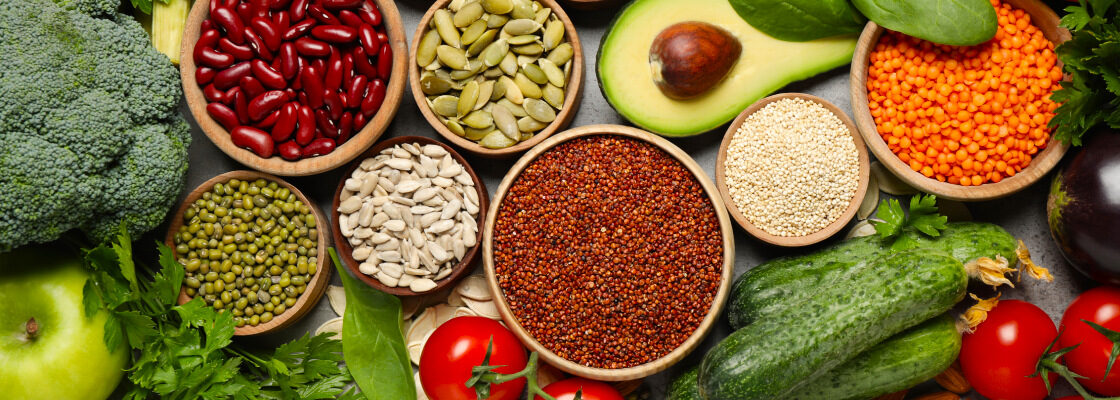
Anti-inflammatory Diet
Inflammation runs rampant in our society and the diet is a major contributor to levels of inflammation. Elevated inflammation levels wreck havoc on the body, increasing pain and causing tissue damage.
Foods like meat and milk increase the production of inflammatory products called prostaglandins.
Joints are vulnerable to inflammation and adhering to an anti-inflammatory diet is one of the best things you can do to improve joint health.
Foods high in Omega-3 fatty acids found in foods like SMASH fish, walnuts, or chia seeds can lower levels of inflammation.
Reducing processed foods, foods high in sugar, and trans-fats as these foods contribute to inflammation in the body.

Hormone Balancing
- Estrogen has an anti-inflammatory effect on the body, so when levels decline, joint pain can emerge.
- Elevated cortisol from chronic stress can lead to increased levels of joint pain.
- Testosterone has been shown to promote ideal weight, disc, and tendon health while also decreasing levels of inflammation i.e. TNF-alpha, IL-1B, IL-6, and CRP
Losing weight if needed
- Excess body weight can put a strain on the joints and make joint pain and injury more likely. Additionally, excess body fat is itself inflammatory, and as mentioned earlier inflammation can create a host of problems for joints.
PRP
- Platelet rich plasma (PRP) is an excellent option for many joint related problems. PRP is simple and effective, using your own body’s healing factors to stimulate the joint healing process. PRP can provide long-lasting healing benefits, and we typically see above a 60-80% improvement rate in our patients. For more about PRP, check out our article here (link to PRP blog here)
Prolotherapy
- Prolotherapy is similar to PRP, and involves injecting a solution of dextrose and saline into the affected joint to stimulate the healing response. Prolotherapy Joint Injections are a type of regenerative medicine that uses your body’s healing powers to help you recover from your injury.

Ready to schedule an appointment?
